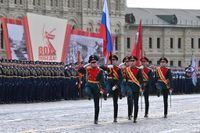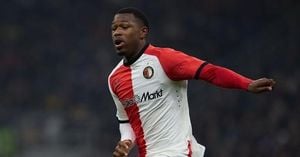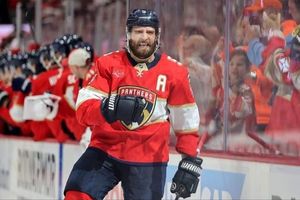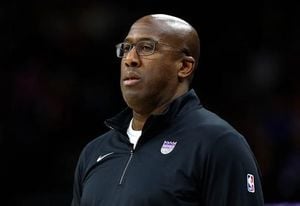The 80th anniversary of Victory Day is being celebrated in Moscow with a grand parade and the presence of numerous world leaders. The event, which commemorates the defeat of Nazi Germany, has attracted dignitaries from across the globe, highlighting its significance on the international stage.
Among the notable attendees is Milorad Dodik, the head of the Serbian Republic, who arrived in Moscow to partake in the celebrations. "I am here to celebrate Victory Day over fascism, this is an important event, and I am glad to be present at such a gathering," Dodik stated, emphasizing the day's importance.
In addition to participating in the festivities, Dodik is scheduled to meet with Patriarch Kirill during his visit. The main event, the Victory Parade, is set to commence at 10:00 AM on May 9, 2025, on Red Square. This year, servicemen from 19 partner countries will join the parade, showcasing a united front against the remnants of fascism.
The celebrations kicked off with the arrival of several foreign leaders in Moscow, including Shavkat Mirziyoyev, the President of Uzbekistan, who also came to participate in the Victory Day events. During his stay, Mirziyoyev plans to meet with Russian leaders to discuss bilateral cooperation.
On May 8, 2025, a host of other leaders arrived in Moscow, including Kassym-Jomart Tokayev, the President of Kazakhstan, Alexander Lukashenko, the President of Belarus, Emmerson Mnangagwa, the President of Zimbabwe, Umaru Sissoku Embalo, the President of Guinea-Bissau, Taiye Atske-Selassie, the President of Ethiopia, and Alan Gagloev, the President of South Ossetia. The arrival of these leaders underscores the broad international interest in the commemoration.
Additionally, on the same day, Milorad Dodik and Abdel Fattah al-Sisi, the President of Egypt, also arrived in the Russian capital, further adding to the list of dignitaries attending the celebrations. The presence of leaders from various countries illustrates the significance of the Victory Day celebrations, which honor the sacrifices made during World War II.
As the day of the parade approaches, anticipation builds. The event will not only feature foot soldiers but also military equipment and aerial displays. This year, the total number of participants is expected to exceed 10,000, reflecting the scale and importance of the occasion.
Russian President Vladimir Putin will lead the ceremonies following the parade. After the military display, Putin and foreign leaders will lay flowers at the Tomb of the Unknown Soldier near the Kremlin wall, a poignant reminder of the sacrifices made during the war. Onlookers can expect a powerful display of military might and a somber reflection on the cost of peace.
Among the 29 heads of foreign delegations who will witness the parade are Xi Jinping, the President of the People's Republic of China, Aleksandar Vucic, the President of Serbia, Alexander Lukashenko, the President of Belarus, Robert Fico, the Prime Minister of Slovakia, Miguel Diaz-Canel, the President of Cuba, Nicolas Maduro, the President of Venezuela, and Luiz Inacio Lula da Silva, the President of Brazil. Their participation highlights the global recognition of Victory Day and its implications for contemporary geopolitics.
Notably, the journey of some leaders to Moscow has not been without challenges. Prime Minister Robert Fico of Slovakia had to take a longer route to Russia due to restrictions imposed by Estonia, Latvia, and Lithuania, which prohibited his plane from flying through their airspace. This incident has drawn attention to the political tensions within Europe, especially regarding relations with Russia.
As the parade approaches, Russian officials have expressed their readiness to welcome all who wish to celebrate this monumental date. Dmitry Peskov, the Russian Presidential Press Secretary, noted, "We will be glad to see everyone who is ready to celebrate this grand date with us." This sentiment is echoed in the preparations underway in Moscow, where the geography of attending leaders spans nearly all continents.
The Victory Day celebrations are not merely a national event but a reaffirmation of the collective memory of the sacrifices made during World War II. The participation of various global leaders signifies a shared commitment to remembering the past while fostering international cooperation against contemporary threats.
As the world watches, the events in Moscow on May 9, 2025, will serve as a reminder of the importance of unity in the face of adversity. The legacy of those who fought against fascism remains relevant today, and the commemoration of their sacrifices continues to resonate across borders.
In summary, the 80th anniversary of Victory Day is set to be a historic occasion, marked by a grand parade on Red Square and the presence of numerous world leaders. As they gather to honor the past, their collective presence also speaks to the ongoing need for dialogue and collaboration in addressing the challenges of the present.




